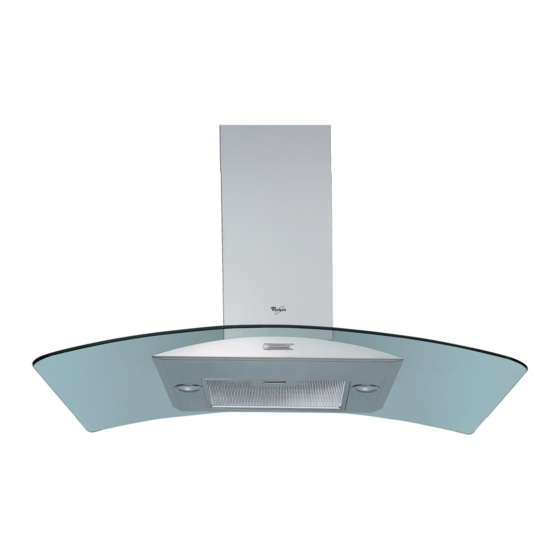Whirlpool AKR 951 Manuel d'utilisation - Page 6
Parcourez en ligne ou téléchargez le pdf Manuel d'utilisation pour {nom_de_la_catégorie} Whirlpool AKR 951. Whirlpool AKR 951 9 pages. 100cm island curved glass cooker hood, akr 951/1 ix
Également pour Whirlpool AKR 951 : Fiche d'installation (10 pages), Fiche d'installation (20 pages)

SAFEGUARDING THE ENVIRONMENT
1. Packing
Packing materials are 100% recyclable and are marked with the
recycling symbol
.Comply with the local regulations for
disposal. The packing materials (plastic bags, polystyrene, etc.)
are a potential source of danger and must be kept out of the
reach of children.
2. Product
This appliance is marked in compliance with European Directive
2002/96/EC, Waste Electrical and Electronic Equipment (WEEE).
By ensuring that this appliance is correctly scrapped, the user can
help prevent potentially harmful consequences for the
environment and the health of people.
The symbol
on the product or the accompanying
documentation indicates that this product should not be treated
as domestic waste but must be taken to a suitable collection
centre for the recycling of electrical and electronic equipment.
Disposal must be carried out in compliance with local regulations
on waste disposal.
For further information on the treatment, recovery and recycling
of this product, contact the competent local office, the
household waste collection service or the shop where you
purchased the appliance.
IMPORTANT INSTRUCTIONS FOR
SAFETY
WARNING: To reduce the risk of accidents, electric shock,
injury or damage, when using the hood comply with the basic
precautions, including the following.
1. Always disconnect the hood from the power supply before
carrying out any installation or maintenance operation on the
appliance.
2. Installation must be carried out by a specialised technician, in
compliance with the manufacturer's instructions and local
safety regulations.
3. Earthing of the appliance is compulsory. (Not possible for
Class II hoods).
4. Never use multisockets and extension leads.
5. The electrical components must no longer be accessible to
the user after installation.
6. Do not touch the hood with wet parts of the body or use it
when barefoot.
7. Do not pull the appliance power cable to unplug it.
8. After-sales service – do not repair or replace any part of the
hood unless specifically indicated in the manual. All other
maintenance services must be carried out by a specialised
technician.
9. When drilling the wall, make sure not to damage the
electrical connections and/or pipes.
10. The ventilation ducts must always discharge to the outside.
11. The Manufacturer declines any liability for improper use or
incorrect setting of the controls.
5019 318 33303
12. The appliance is not intended for use by children or persons
with limited physical, sensory or mental abilities or without
experience and knowledge of it, unless they are under the
supervision of or instructed in its use by a person responsible
for their safety.
13. Keep children away.
14. To reduce the risk of fire, only use a metal inlet duct.
15. Children must be supervised so that they do not play with
the appliance.
16. The product must be disposed of in compliance with local
regulations on waste disposal.
17. For further information on the treatment, recovery and
recycling of this product, contact the competent local office,
the household waste collection service or the shop where
you purchased the appliance.
18. Regular cleaning and maintenance is essential for correct
hood operation and good performance. Frequently clean all
encrustations from dirty surfaces to prevent the
accumulation of grease. Regularly clean or replace filters.
19. Do not "flambé" food under the hood. Naked flames could
cause a fire.
20. The room must have adequate ventilation when the hood is
used at the same time as appliances operating on gas or
other fuels.
21. The discharge air must not be eliminated in a duct used to
remove fumes produced by appliances operating on gas or
other fuels, but must have a separate outlet. All the national
regulations on air discharge envisaged by art. 7.12.1 of CEI
EN 60335-2-31 must be observed.
22. If the hood is used together with other appliances operating
on gas or other fuels, the negative pressure in the room
must not exceed 4 Pa (4 x 10
the room is adequately ventilated.
23. Do not leave pans unattended when frying, since the cooking
oil could catch fire.
24. Make sure the lamps are cold before touching them.
25. The hood is not a shelf, therefore do not overload or place
objects on it.
26. Do not use or leave the hood without its lamps correctly
installed - risk of electric shock.
27. Wear work gloves for all installation and maintenance
operations.
28. The product is not suitable for outdoor use.
29. The air sucked by the hood must not be eliminated through
the same flue of the heating system or other appliances using
gas or other fuels.
TR GB
-5
bar). Therefore, make sure
